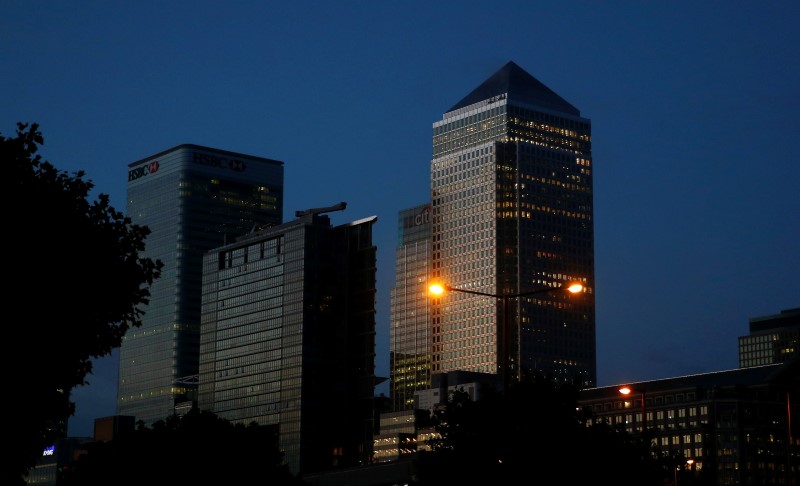By Jamie McGeever
LONDON (Reuters) - Britain's Brexit vote has battered UK bank shares and rocked the country's financial markets, but a 2008-style seizing-up of its banking system looks unlikely.
There have been echoes of 2008 following the June 23 vote to take Britain out of the European Union, with some bank shares tumbling more than 30 percent, sterling falling its most in modern history and Britain losing its triple-A credit rating.
But steps taken since the financial crisis to beef up banks' capital and central bank liquidity support and to lower leverage across the banking system mean it is better equipped to cope with a severe economic or financial shock, analysts say.
The plumbing of the financial system - short-term interbank and money markets - clogged up only a little as the premium for risk-free lending relative to unsecured lending rose to its highest in four years.
"In the near term, money funds have been relatively stable with no material referendum-related flows following the vote," Fitch Ratings said in a report on Wednesday.
Sterling money market funds went into the referendum well prepared, with overnight liquidity of 32 percent and one-week liquidity of 42 percent on average, according to Fitch.
This was high relative to typical levels and its criteria for AAA-rated money market funds of a minimum 10 percent for overnight and 30 percent for one week, it said.
The sterling "Libor-OIS" spread, a gauge of banks' willingness to lend to each other and perhaps the most fundamental barometer of the banking system's health, hit its widest level in four years at 26 basis points.
The wider spread was a result of traders pushing the OIS rate below 30 basis points for the first time since 2009, effectively pricing in a Bank of England rate cut, while the interbank Libor rate only came down around 4 basis points.
But the increase in the spread was small and compared to price swings in some other major asset markets, it was minuscule.
Sterling slumped more than 8 percent against the dollar on June 24, its biggest fall since the free-floating exchange rates were introduced in the early 1970s, to a 31-year low.
That was double the rate of decline on Sept. 16, 1992, when billionaire financier George Soros famously "broke the Bank of England" after his bets against the pound were instrumental in ejecting it from the Exchange Rate Mechanism.
Shares in Royal Bank of Scotland (L:RBS) and Barclays - (L:BARC) fell more than 30 percent and UK mid-cap stocks - more sensitive to the UK economy than the globally driven FTSE 100 - had their biggest fall since the 1987 market crash (FTMC).
The selling was even more ferocious in parts of Europe, particularly in the banks of the so-called "peripheral" euro zone countries like Italy. Trading in several was suspended as "circuit breaker" market protection mechanisms kicked in.
But central banks and market regulators did not step in.
"The market infrastructure has coped well with the impact, and that was not a reason to have any extraordinary measures," Steven Maijoor, chairman of the European Securities and Markets Authority, told a Politico event in London on Wednesday.
Sterling Libor-OIS http://tmsnrt.rs/295GK14
Sterling FX basis http://tmsnrt.rs/293mb1Q
Sterling and UK govt bond yields http://tmsnrt.rs/28XcX7f
Barclays shares http://tmsnrt.rs/293mbPt
RBS shares http://tmsnrt.rs/295IQ12
OFFICIAL SUPPORT
Yet there is potential for further strains to appear if financial conditions deteriorate as a result of the heightened political and economic uncertainty.
Ratings agency S&P Global this week stripped Britain of its last remaining top-notch triple-A credit rating, the first time it has chopped an AAA-rated sovereign credit rating by two notches in one move.
Rival agency Moody's Investors Service lowered the outlooks on the ratings of 12 UK financial firms, and changed the outlook on the UK banking system to negative from stable.
Investors rushed to protect themselves against the risk of bank default, pushing up credit default swap (CDS) rates on Barclays to a three-year high. The rise was on a par with that seen the day after Lehman Brothers collapsed in September 2008.
And pressure in the sterling/dollar cross currency basis markets, effectively the cost of swapping sterling into dollars without the exchange rate risk, boiled over immediately after the referendum to its most intense in four years.
A BoE money market operation this week drew a record volume of bids for cash from financial market institutions. But they were unwilling to pay a high rate or offer top-quality collateral, suggesting money market tensions after last week's vote remain contained.
"We're not seeing the kind of stress we saw in the Lehman days. The fall in bank shares is an earnings issue, not a funding issue," said Fabio Bassi, head of European Rates Strategy at JPMorgan (NYSE:JPM) in London.
"For a repeat of 2008, you would need a much greater degree of stress than we've had since the referendum given the amount of liquidity in the system and support from central banks," he said.
The widening of sterling/dollar basis and Libor/OIS spreads in recent days was nowhere near as severe as the post-Lehman period.
Britain pumped 66 billion pounds into Royal Bank of Scotland (L:RBS) and Lloyds (L:LLOY) during 2008/09 and provided tens of billions more in liquidity support to the sector.

The BoE said on Friday it could provide more than 250 billion pounds plus "substantial" access to foreign currency to ease any squeeze in markets following the Brexit vote. Some analysts say it could reactivate and expand its 375 billion pound bond-buying stimulus quantitative easing programme opened in March 2009 but which has been dormant since July 2012.